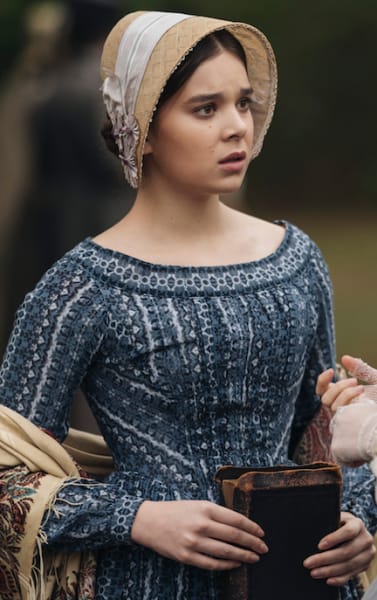Dickinson Season 2 Review: Hailee Steinfeld Returns in Apple TV’s Arch Multi-Hyphenate Series

Dickinson
Number of Seasons Released: 2
Streaming Platform: Apple TV+
Dickinson takes place with a modern sensitivity and tone during the era of Emily Dickinson. It takes us through Emily’s world, boldly challenging the complexities of culture, gender, and family through the perspective of a young writer who from her creative point of view can not fit into her own time. Dickinson is the coming-of-age tale of Emily-the journey of one woman to make her voice heard.
EPISODES
| Episode Information |
|---|
| “Before I Got My Eye Put Out” Airdate: January 8, 2021Episode / Series Number: 02 / 01Directed by: Christopher StorerWritten by: Alena Smith |
| “Fame Is A Fickle Food” Airdate: January 8, 2021Episode / Series Number: 02 / 02Directed by: Christopher StorerWritten by: Rachel Axler |
| “The Only Ghost I Ever Saw” Airdate: January 8, 2021Episode / Series Number: 02 / 03Directed by: Rosemary RodriguezWritten by: Alena Smith & Sophie Zucker |
| “The Daisy Follows Soft The Sun” Airdate: January 15, 2021Episode / Series Number: 02 / 04Directed by: TBAWritten by: Robbie Macdonald |
| “Forbidden Fruit A Flavor Has” Airdate: January 22, 2021Episode / Series Number: 02 / 05Directed by: TBAWritten by: Ken Greller |
| “Split The Lark” Airdate: TBAEpisode / Series Number: 02 / 06Directed by: TBAWritten by: Alena Smith |
| “Forever – Is Composed Of Nows” Airdate: TBAEpisode / Series Number: 02 / 07Directed by: TBAWritten by: Yael Green |
| “I’m Nobody! Who Are You?” Airdate: TBAEpisode / Series Number: 02 / 08Directed by: TBAWritten by: Alena Smith & Ayo Edebiri |
| “I Like A Look Of Agony” Airdate: TBAEpisode / Series Number: 02 / 09Directed by: TBAWritten by: Robbie Macdonald |
| “You Cannot Put A Fire Out” Airdate: TBAEpisode / Series Number: 02 / 10Directed by: TBAWritten by: Alena Smith |
Dickinson Season 2 simply brilliant. Not simply her heroine, virtuoso poet Emily Dickinson’s singular brilliance, but the societal constructs of genius and all the pleasure and despair associated with having that sort of talent. Of course, with Dickinson’s prose, the romantic realist antebellum dramedy speckles his plot, artful chyrons here, lyrical recitations there, but Dickinson is more interested in wrestling with the process of young Emily than her performance.
Also Read: Most Awaited Movies of 2021 & Their Release Dates
She meets a variety of famous artists in the first and second seasons, such as Louisa May Alcott (Zosia Mamet) and landscape architect Frederick Law Olmsted (Timothy Simons), who briefly mentor her, impart market advice or alert her of the dysphoria of celebrity. They can only do so much: Emily does not always feel in control of the words that pulse through her, but to pick her listeners is fundamentally beyond her capacity. In the dark, will genius flower?

Admittedly, I got away with mixed emotions from the first few episodes of the season. I still don’t quite comprehend the show’s irony-dense comedic patterns, which are more likely than throaty laughs to evoke knowing smirks, but I now understand its sapiosexual allure better. (The funniest lines, by far, are the historical footnotes written into the dialogue that enable the mores of the Victorian period to be fleetingly clarified by different characters.)
Creator Alena Smith had gained better mastery of her writing by the end of season 1, and the mood of the show settled into something a little less brassy and a little more tender than the opening episodes conveyed. Not relying exclusively on dizzying tonal juxtapositions, due to this revised balance of 21st-century irony and 19th-century poignancy, the series flourishes in ten-episode season 2.
Given the recent success of Bridgerton’s Netflix Regency romance and Hulu’s royal comedy The Great, teen-centered feminist revisionism seems to fulfill the urge of many fans to see creamy costume dresses embellish contemporary political acidity. Dickinson, too, is sweet and bitter, portraying Emily (Hailee Steinfeld) with aesthetic brilliance and relational confusion as an adolescent.
Also Read: Most Awaited Movies of 2021 & Their Release Dates
The series remains meticulously studied, several chapters inspired by real-life specifics of the life of Dickinson as a part of the rural aristocracy of Massachusetts, including her fondness for baking black spiced brandy cakes and the crushing death of a family friend in the Civil War. Smartly, the writers continue to discuss Amherst past Emily’s imaginative sturm und drang, supplying its growing cast with more screen time this season. It takes her incessant bewailing yet limited in scale, just how many times will we watch a teenager sulk over her creative fate, even though she is Dickinson’s Emily friggin? “I don’t need my eyes to see!” she squawks following an appointment with a psychiatrist. “All I need is my soul.”
Dickinson, at least, understands the penchant for self-seriousness of its protagonist. A quadrant of bitchy townies played by Gus Birney, Sophie Zucker, Kevin Yee and Allegra Heart, the show makes up for it by surrounding her with a coterie of buoyant flibbertigibbets, including her budding aesthete niece, Lavinia (Anna Baryshnikov), and my favorite characters. If Emily was criticizing middle-class domesticity during the first season, the second shows her accepting giftedness as an identification.
The relationship between Emily and Sue (Ella Hunt), her former boyfriend and present sister-in-law, proceeds to anchor the pathos, but their romance only simmers as the current Mrs. Austin Dickinson assumes an improvident socialite’s mask. Sue persuades Emily to expand her circle of detractors and introduces her to Samuel Bowles (Finn Jones, Game of Thrones), the sleek publisher and editor-in-chief of the Springfield Republican newspaper, felt burdened as Emily’s sole confidante and reader. “sun”sun. “I gave my poem to him and now it’s like he holds my life in his hands. […] And without the warmth of his approval, I can’t grow.”
For Emily, who spends the season struggling about what celebrity might mean for her, publishing is sex, death, fame and love all at once. (Anonymity keeps her thoughts going, her vanity is tempted by immortality.) She bends and contorts herself into existential knots trying to unravel the universe’s mysteries.
The season, as such, leans more towards phantasmagoria. Emily continues to be trailed by a spectre who calls himself Nobody (‘I’m Nobody! Who are you?/ Are you-Nobody-also?’) as her health starts to falter. She also consorts with Death (Wiz Khalifa) himself, often being picked up in his black stagecoach so that, like a few high school freshmen, they can spar on the essence of destiny.
The best of these recent series has Emily on earthly soil witnessing the uncanny. In one, to draw her haunting spirit forward, she hosts a séance. She sacrifices her sight to the world around her on the other hand, allowing her to inhabit physical areas that she otherwise could not roam. This may be disorienting hyperreality, but it’s also satisfyingly unnerving.
Pico Alexander as Ship, a new boarder at the Dickinson residence, and Ayo Edebiri as Hattie, a household employee of Emily’s brother and his wife, are new cast members. A especially superb discovery is Edebiri, who was recently selected to replace Jenny Slate in the animated comedy Big Mouth. (“You have no idea how many white secrets I’m keeping,” boasts Hattie.)
Smith and co. dig into Black abolitionism on the brink of the American Civil War, alongside circumnavigating Emily’s philosophical crises, Sue’s various betrayals and Lavinia’s female awakening. A tonal sibling to Showtime’s equally absurd historical drama The Good Lord Crow, Dickinson, from the viewpoint of the underground radicals who financed it and the pampered literati who undermined it, covers John Brown’s Harpers Ferry raid.
Dickinson can dehydrate history into digestible chunks, but “Well, who cares if it’s real — as long as it looks good, right?” as one character murmurs to another.
